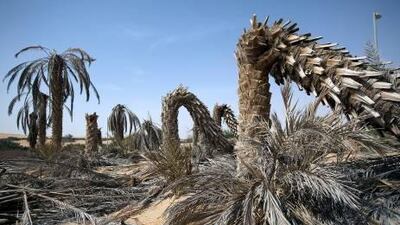ABU DHABI // A machine designed by Egypt's ministry of defence may help UAE farmers detect the date palm weevil before the pest can destroy entire crops.
The tiny red insects burrow into palm trunks and devour trees from within. Infestations usually go unnoticed until the weevils have hollowed out trunks. Then the trees collapse beneath their own weight, or are blown over by breezes.
Early detection may save the trees, according to Amein Amin, an engineer with Egypt's ministry of defence.
Mr Amin said he planned to base his machine's distribution for the Gulf in Abu Dhabi.
His system, which can detect the molecular signature of a weevil's DNA, can help catch an infestation before it is too late. Like a metal detector, the machine scans a tree, searching for DNA traces of the pests.
It can determine not only whether the tree has been infected, but also where the blight is spreading.
Weevils have had a major impact on date-palm production globally. Of Egypt's 12 million trees, Mr Amin estimates that the pest has infested 25 per cent.
The blight, said to be native to Africa and India, was first reported in the Gulf in the mid-1980s. Since then, it has infested 5 per cent of the UAE's 42 million date palm trees. In Al Gharbia, the infestation rate is as high as 10 per cent. The weevils destroy palm trees from within by interfering with the flow of nutrients through the trunk.
Once an infestation destroys a tree, the entire palm should be torched: if the tree is simply removed, the resilient weevils can infect nearby trees or farms.
"The machine can also determine the height of the infestation," Mr Amin said. By tracking the spread of the infestation, farmers can determine whether their treatment methods are effective.
"If the height [of the area that is infested inside the tree] stays the same, then it's good. If it goes up, you must treat again," he said.
According to Mr Amin, the ability to pinpoint infestations and track treatment will help reduce the amount of pesticides that are applied.
Last autumn, the Government announced an initiative to reduce pesticide use by 25 per cent by 2013, and to make the switch to organic fertilisers.
Efforts to minimise the use of fertilisers and pesticides are part of the Abu Dhabi Food Control Authority's mission to make farming more competitive, while also reducing water usage by 40 per cent.
Many farms rely too heavily on pesticides to combat the weevil, but experts say the chemicals are increasingly ineffective. That is because they do not penetrate the middle of the tree, where the insects live.
Additionally, the heavy use of chemical pesticides destroys the quality of soil, and contaminates fruits and vegetables. The insects and other organisms eventually become resistant to the toxins, which forces farmers to use more and more chemicals.
Mr Amin's instrument can allow pest control to target only the affected trees.
"You'll be able to know which trees are disease-free, and maintain that, without treating it with chemicals," Mr Amin said.
The machine has been approved by the Egyptian government. Mr Amin is assessing how many machines will need to be manufactured to begin the fight against the blight in Egypt.
The engineer won second prize in the best new technique section of the third annual Khalifa International Date Palm Awards earlier this week.
The event attracted 131 entrants - up from 67 last year - from 24 countries.
Eight awards were presented. Four first-place winners received Dh300,000. Those in second place were awarded Dh200,000.

